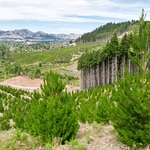Getty Pictures
msn.com – 05-11-2021
Prof Tim Forsyth’s criticism of productive plantation forests is out of touch with the global value of these forests (Letters, 3 November).
Expansion of productive forests remains one of the most cost-effective strategies for removing and storing CO2 from the atmosphere, in addition to producing timber on a sustainable basis. A recent study showed that productive coniferous forests support up to 269% more greenhouse gas mitigation potential than newly planted broadleaf conservation forests.
Only 3% of the total global forest area comprises productive plantation forest, yet they produce one-third of the world’s industrial timber. Productive forests leave a smaller environmental footprint by focusing harvesting activity in relatively small areas in comparison with expansive and damaging timber extraction from natural forests. Expansion of productive forests is not keeping pace with global timber demand, with the shortfall increasingly sourced from natural and semi-natural forests that are already under severe pressure. Productive forests yield more than 10 times more wood on an area basis than natural forests.
It is incumbent on developed nations – as the biggest emitters of carbon – to increase investment in climate change mitigation strategies including expansion of their domestic productive forest areas. Developed nations are also the biggest users of wood (the UK is the world’s second-biggest importer of wood products), and increasing domestic wood production would reduce the need for imports, indirectly reducing the damage and loss of the world’s natural forests through timber extraction offsetting (ie using timber output from productive forests to reduce logging damage and loss of natural forests). Greater reliance on domestically sourced wood also reduces the carbon footprint of transporting timber products long distances.
Dr Andrew Cameron
Institute of biological and environmental sciences, University of Aberdeen




